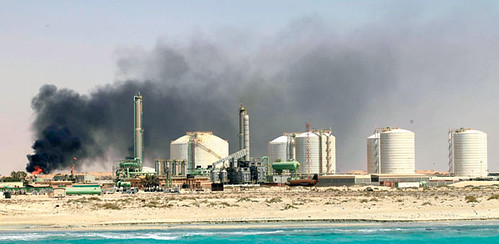
Zueitina oil terminal located near Benghazi, Libya has been the scene of labor unrest. The industry in Libya is no facing a downturn in production after the imperialist overthrow of Gaddafi., a photo by Pan-African News Wire File Photos on Flickr.
Brent Rises to Five-Month High on Syria Clash, Libya Loss
By Grant Smith - Aug 27, 2013
Brent crude rose to its highest level in six months after the U.S. said it will hold Syria’s government accountable for the use of chemical weapons, while Libya’s production slumped amid protests.
Futures climbed as much as 1.7 percent in London. The evidence is “undeniable” that Bashar al-Assad’s government used toxic weapons against residents of a Damascus suburb, U.S. Secretary of State John Kerry said. Libya’s National Oil Corp. said output may have dropped below 200,000 barrels a day, the lowest since the 2011 uprising against Muammar Qaddafi.
“Geopolitical turmoil and supply risks” are supporting prices, said Eugen Weinberg, head of commodities research at Commerzbank AG in Frankfurt. “The situation in the Middle East seems to be escalating, especially as the prospect of military action by the West in Syria has increased.”
Brent for October settlement jumped as much as $1.87 to $112.60 a barrel on the ICE Futures Europe exchange, the highest since Feb. 28, and was at $112.51 as of 12:59 p.m. London time. The volume of all futures traded was about 25 percent above the 100-day average. The European benchmark crude was at a premium of $4.50 to West Texas Intermediate, compared with $4.81 yesterday.
WTI for October delivery climbed as much as $2.22 to $108.14 in electronic trading on the New York Mercantile Exchange. The contract dropped 50 cents to $105.92 yesterday. Prices have gained 18 percent this year.
‘Indiscriminate Slaughter’
President Barack Obama will hold the Syrian government accountable for the “indiscriminate slaughter” of its own people with chemical weapons last week, Kerry said yesterday. Obama hasn’t decided whether the U.S. will take military action in Syria, according to an administration official who asked for anonymity to discuss internal deliberations.
U.K. Foreign Secretary William Hague said yesterday that Britain is convinced Assad was behind the Aug. 21 attack in Ghouta, outside Damascus, and that there was agreement with the U.S. and France on the need to respond. The U.K. government plans to decide today whether to recall Parliament and seek approval for taking action, said a person familiar with the discussions who asked not to be identified.
The Middle East accounted for 35 percent of global oil output in the first quarter of this year, according to data from the International Energy Agency.
Elephant Halt
Libya’s El Feel, or elephant, oil field was halted by protesters last night, National Oil Corp. Chairman Nuri Berruien said today in an interview in Tripoli. The North African nation’s export capability has been crippled since members of the Petroleum Facilities Guard seized control of terminals last month to press for better working conditions.
Crude inventories in the U.S., the world’s largest oil consumer, probably rose by 700,000 barrels last week, the first increase in four weeks, according to the median estimate of nine analysts surveyed by Bloomberg. The Energy Information Administration, the Energy Department’s statistical unit, is scheduled to release its weekly report tomorrow.
Refiners are expected to have cut average operating rates by 0.2 percentage point, the survey showed. Gasoline stockpiles fell by 1.25 million barrels in the week ended Aug. 23, according to the survey. Distillate supplies, including heating oil and diesel, are expected to have gained by 500,000 barrels.
To contact the reporter on this story: Grant Smith in London at gsmith52@bloomberg.net
To contact the editor responsible for this story: Stephen Voss on sev@bloomberg.net
No comments:
Post a Comment